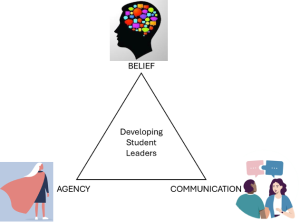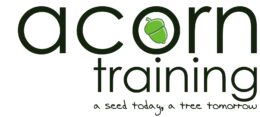
3 Keys to Unlock Student Leadership Development Pt. 2
 Oct 31, 2024
Oct 31, 2024
A Teacher’s Perspective to Student Leadership Development
In this article, an MOE-trained teacher shares her views on developing student leaders during their Secondary School years. She highlights three main aspects by which teachers can enable and empower students to thrive as leaders.
These are (1) agency, (2) belief and (3) communication respectively. Each will be dealt with in detail in the article, do note that in practice, these should overlap and not be exercised individually.
If you haven’t read the first half, read Part 1 first!
Part 1

COMMUNICATION
Communication is a key area that we must address at the onset. From the words that we say, to our dress and our body language. Our students read us as a whole being, not merely hearing the words we say, or we think we are saying. For example, a teacher comes in to brief his leaders, but he is taking attendance methodically and reading instructions off a paper without making any eye contact. Students know immediately not to bother listening for their teacher is not actually speaking to them, he is merely trying to complete his task.
On the flip side, if a teacher entered the room smiling and greeting each child in turn. Having learnt everyone’s names, they all sit, and he begins to outline the tasks they need to tackle together as a student leadership body. Then the students will know to take this teacher and their role seriously, because the teacher respects them as individuals and views them as important persons.

Whilst the hardware of communication is important, the software is really what keeps the students vested. A communications trainer may highlight the importance of presenting the tasks clearly, projecting one’s voice loudly or crafting messages and e-mails skilfully to seal a deal. Developing student leaders requires all that and more. As mentioned in the prelude, prescriptive style task-orientation no longer applies today.
Instead, teachers make suggestions and communicate clear expectations or outcomes. Once students have a clarity of task and a common goal, they set out to achieve them in their own ways. Our role as educators stops as providing the objectives and the development comes in facilitating our leaders to reach that same end. However, if we are vague with assigned tasks and unapproachable, we fail in our communication and cannot expect our students to thrive. This brings us nicely to the other bottom end of the triangle – agency.
AGENCY
Tasks in and of themselves are dead. Plan a teachers’ day celebration. Conduct a survey of student satisfaction of the canteen. Run a camp for incoming year-one students. Essentially, you could take the same programme or the same survey and run them alternate years again and again. Yet our aim is not to simply run the show but to develop the leaders behind each camp, each major school event etc.
After communicating clearly – sharing the intended outcomes sincerely, ensuring they know they can depend on us for constructive feedback and back up. We then release the students, with proper handles – students who are given agency will thrive. The reason is simple, they too want to succeed.
It must be said that putting the right tool in the right student’s hand is critical for development. The most straightforward way of doing that would be knowing our students’ strengths and weaknesses. Whilst working as a team, who contributes the most creative ideas, who quietly observes? Which student organises the notes, which one then delegates the task and who finally gets the work done?
There are many strengths assessments available in the market today should we want to formally assess our students. But the most dependable way would be to spend time with them. It is under pressure or over months where their true colours come through, and it is the student developer’s responsibility to know their students well enough to assign the right assignment.

For us educators, it may be our ninth or tenth graduation ceremony or school fair, but for our student leaders, this might be the first or last one they are planning in their secondary school career. At fourteen or fifteen, these school events that we consider ‘work’ might be for them a core memory which they take to adulthood. As such, we give them agency, the space to be creative but also the tools to succeed.
Giving our leaders agency does not mean dropping the ball and allowing them to run the show. It could look like being present in a meeting, but instead of conducting it, being a quiet and affirming presence. It could also look like giving timely advice whilst planning safeguards lest they fail. A fine balancing act, when executed well, would seem like the students did most of the work on their own. That is when a student developer can truly say, job well done!
BELIEF
At the apex of the student leadership development triangle then sits belief. With open and trustworthy communication channels coupled with scaffolded platforms enabling agency, we come to the crux of growth – belief. Primary school science teaches us that plants need sunlight, water, and air to grow. But we know that even in the presence of these three elements, many of our plants take more than that to grow, much less thrive.

We live in very busy times. The advancement of technology has brought about immense workload for the average working adult. In a typical work week, the secondary school student may have more time with their form teacher than their parents or caregivers. This does not mean to say we seek to replace the role of parents, but it does mean that students depend on their teachers for emotional support now more than ever before.
Whilst communication and agency will result in competent doers, the heart of the matter lies in belief. Having them do something in actuality is very different from believing in their ability to do it. What then does belief look like in practice? This might look like praising them in front of fellow teachers while they are within earshot, entrusting them tasks that are slightly beyond their current ability or affirming the slightest initiatives and ideations on their part.

Did you know that it takes 10 positive statements to debunk a single criticism? When was the last time you praised a student for a job well done? Would you keep that in mind the next time you want to say a harsh word to a child?
If you want a student to do, give them a list. If you want a student to lead, give them agency. But if, as a student developer, you truly want your students to thrive, then believe in their ability to succeed, even if it is only at the infancy stage. Build on their achievements, praise their present strengths and encourage them to push boundaries.
CONCLUSION
In my first appraisal after having led the student council for a year, the vice-principal was very frank with me. She mentioned that she had the urge to replace me at the mid-year mark, as she saw my student development style as very hands-off and seemingly laissez-faire. But she decided to wait until term three where a zone-wide national day rally would be held across six different schools. It was at that event rehearsal where it dawned on her, something was very different about the student leaders from our school.
They could be seen (and heard) leading smaller groups of leaders, coordinating the rehearsal schedule and engaging in critical problem-solving without the teacher’s intervention. One was even made the overall student in-charge by a teacher at another school. To have the affirmation of my vice-principal was one thing, to see the students’ thrive at leadership was my true reward.

For them to trust us, we need to communicate with sincerity and integrity. For them to initiate and develop resilience when problems arise, we need to equip them with the right amount of agency. But beyond all that we can say (communicate) and do (agency), student developers need to have faith (belief) that our students are innately leaders in their own right and that they too want to succeed.
